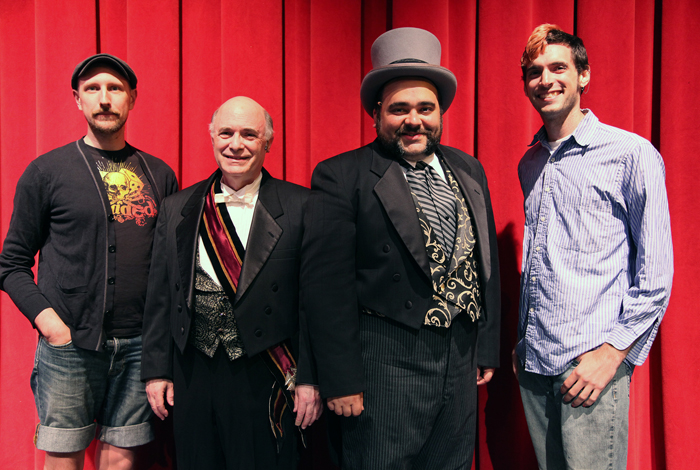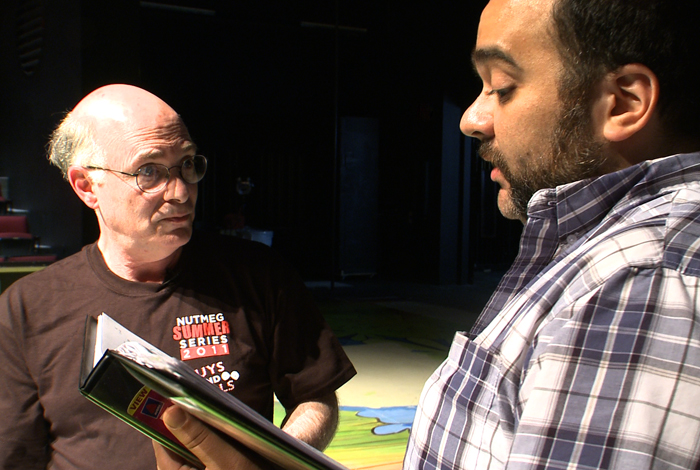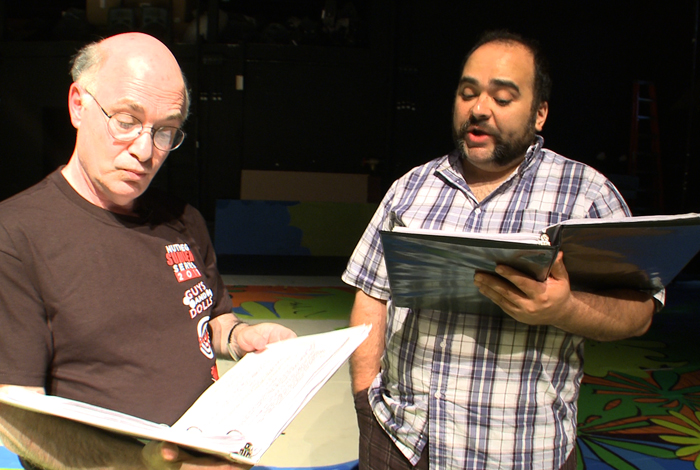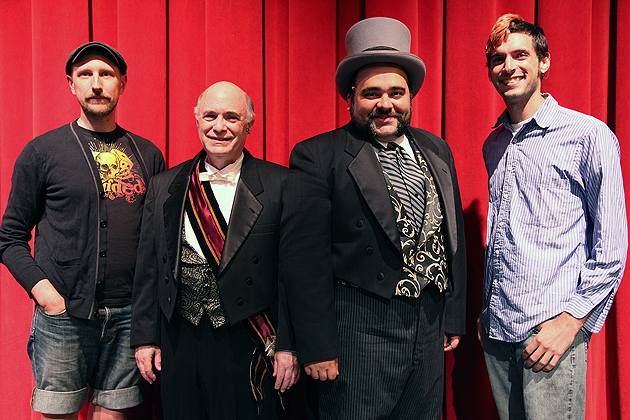
Each year, Connecticut Repertory Theatre (CRT) stages three plays in quick succession during its popular Nutmeg Summer Series. The turnaround time for each production is barely a month from first rehearsal to final performance, and it’s essential that the cast and crew mesh quickly.
“Summer theater is fun,” says actor Richie Ruiz, “but with only a two-week rehearsal process, it’s a little like getting shot out of a cannon. Theater is definitely a collaborative art, and it’s amazing how things can fall apart if people aren’t working together.”
To say that the collaboration worked during this summer’s production of “My Fair Lady” is an understatement. Audiences were enthusiastic and reviews were excellent. What might not be as obvious at first glance is that one of the reasons for the play’s success is that it was a—UConn—family affair, with graduates playing key roles across the production.
Serving as dialect coach for the cast and also playing the role of the Hungarian voice coach, Zoltan Karpathy, was David Alan Stern, ’69 (SFA). Richard Ruiz, ’98 MFA, played a key part as Eliza’s father, Alfred P. Doolittle. Sound in this classic musical was the responsibility of Nathan Leigh, ’05 (SFA), and the costume designer was Kevin Thacker,’08 MFA.
But the connections didn’t end there.
Director Vincent Cardinal, head of UConn’s drama department and artistic director of CRT, taught Ruiz as a student when both were at Buffalo State College before coming to UConn. And while a student at UConn, Ruiz appeared in the role of Don Armado in Thacker’s thesis production of Shakespeare’s Love’s Labours Lost; he also took classes in voice and dialect from Stern as part of his MFA.
From Thacker, who earned his degree in 2008, to Stern, who graduated in the 60’s, each has found his own niche in the dramatic arts.
Kevin Thacker
Thacker hails from the small eastern Kentucky town of Pikeville. He enrolled at the University of Kentucky as a dual journalism and dramatic arts major but hadn’t formulated definite plans for his future. A class in theater design changed all that. “I remember leaving class knowing that I wanted to become a costume designer,” Thacker says, “and that’s what ultimately led me to get my MFA at UConn. I knew the program was strong from both technical and artistic standpoints.”
While at UConn, Thacker’s faculty advisor was award-winning costume designer Laura Crow, who has been instrumental in his training. She describes Thacker as having “a terrific dramaturgical mind and a wonderful way of interpreting the plays he’s designed.”
As part of a team of UConn design and puppetry students, Thacker won the “World’s Best Design Team” trophy in the World Stage Design Competition in 2009. He also received the Zelma H. Weisfeld Costume Design & Technology Award, given to an individual who has demonstrated excellence or outstanding potential in the areas of costume design or technology in the performing arts while pursuing a graduate degree.
Since then his credits have included plays as diverse as Chekhov’s “The Seagull” and “Nobody Don’t Like Yogi,” an affectionate portrait of the New York Yankee’s legendary catcher, Yogi Berra. “I especially love Chekhov and Tennessee Williams,” says Thacker, “and I love doing modern interpretations of the classics. Working on CRT productions has given me lots of opportunities to do that.”
Nathan Leigh
Leigh is a native of Newton, Mass., and he discovered his future career while still in high school, as he learned the basics of sound design working in summer stock on Cape Cod. When he was ready for college, he knew he wanted to head for Storrs. “UConn has a great reputation in the theater, “he says. “It’s a name people talk about and are familiar with. UConn graduates have a solid reputation outside in the real world.”
Coming back to campus this summer was a homecoming for Leigh in more ways than one. In 2003, he was the student sound intern in the last production of the Nutmeg Summer Series before it went on hiatus for several years.
“It’s great coming back as the sound designer,” he says, “but it’s typical of the School of Fine Arts’ loyalty towards its alumni. They tend to bring back students who have gone off and been successful. They’re supportive of their family, which is pretty rare and pretty great.”
Richard Ruiz

When Brooklyn native Stern arrived on campus to study theater performance, his amazing ear for dialect soon became apparent. “Like most undergraduates,” he says, “I didn’t play a lot of major parts on the UConn stage, but because I was the guy who had the ear for accents I got a lot of roles because nobody had to worry about whether I could master the accents. That’s when I first got interested in combining accent and dialect with the totality of performance.”
“The idea of becoming an actor just evolved,” he adds. “When you start acting and you get positive feedback from an audience, it’s a real adrenalin rush that you can’t get anywhere else.”
After earning his undergraduate degree at Buffalo State and beginning his career as a professional actor, he came to UConn to study for his MFA in order to polish his skills. Of working with him years later, Cardinal says, “When I taught Richie at Buffalo State, he was always the funniest and nicest guy in the room. What impressed me about working together again after all these years was not his amazing talent but the craft and control he has developed over time. What looks like antic, first-time improvisation is well thought out craft that he can repeat with amazing comedic and dramatic effect—and he’s still the nicest guy in the room.”
David Alan Stern

A city boy from Manhattan’s lower east side, Ruiz was in second grade when he asked the school librarian if she had any books that would tell him how to get into television commercials. “I had heard that the kids in toy commercials got to keep the toys they played with,” he says, “and I thought all you have to do is play in front of the camera with amazing toys.
Stern, who went on to earn a Ph.D. in speech from Temple University and then taught at Wichita State University and Penn State, moved to Hollywood in 1980 and began a highly successful career as a freelance accent and dialogue coach for movies, television, and theater. He returned to his alma mater in 2004, where he now serves as associate head of the dramatic arts department.
“I was fortunate to study under Nafe Katter [UConn professor emeritus after whom the Nafe Katter Theatre is named], and when I came back here 25 years later it was because UConn’s acting program is a unique blend of a conservatory style of professional training and academics,” says Stern. “We can prepare students for careers in professional theater, while still fulfilling the University’s educational goals.”
Putting It All Together

Frank Mack, as managing director of CRT, is the person responsible for making every aspect of the production come together in a cohesive unit.
“If everyone does the job right,” Mack says, “the audience will be so immersed in a production that they won’t consciously notice that the costumes are perfect, the sound is evocative, and that the characters (and their dialects) fit seamlessly into the play. All the hard work will be transparent and the performance will just work.”
Mack highlights the ‘value added’ by the UConn graduates in the summer production. “We had a great cast and crew, starting with Terrence Mann as Henry Higgins and Eileen Fulton as Mrs. Higgins, and My Fair Lady is still definitely an audience favorite. But it was especially fun watching the contributions of the UConn graduates.
“Each of these guys brought something special to the production, and it’s especially fun watching fairly recent graduates come back as confident professionals,” he adds. “Nathan is a composer and songwriter as well as a sound producer, and he’s won awards for both his music and his sound design throughout the northeast; Kevin’s an award winning designer who is now based in New York; and Richie and David are consummate professionals … It was just great to have them all here at once working on the same production.”



